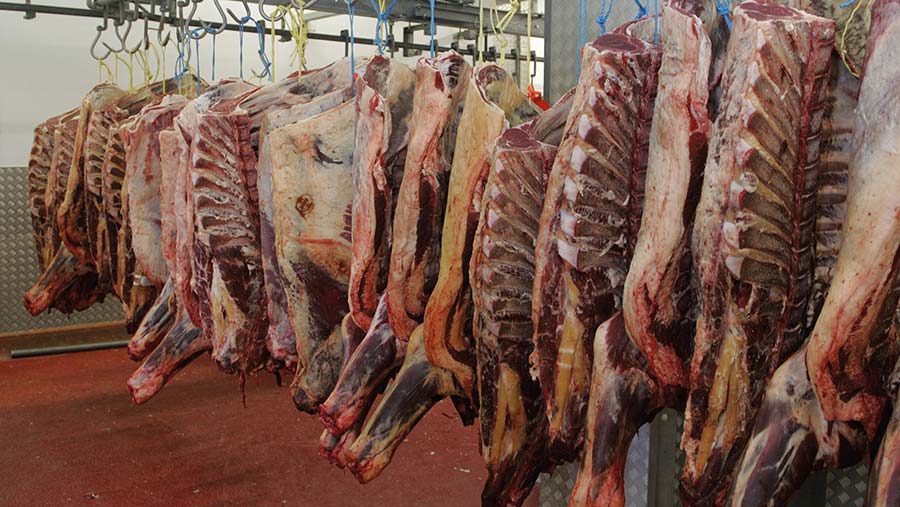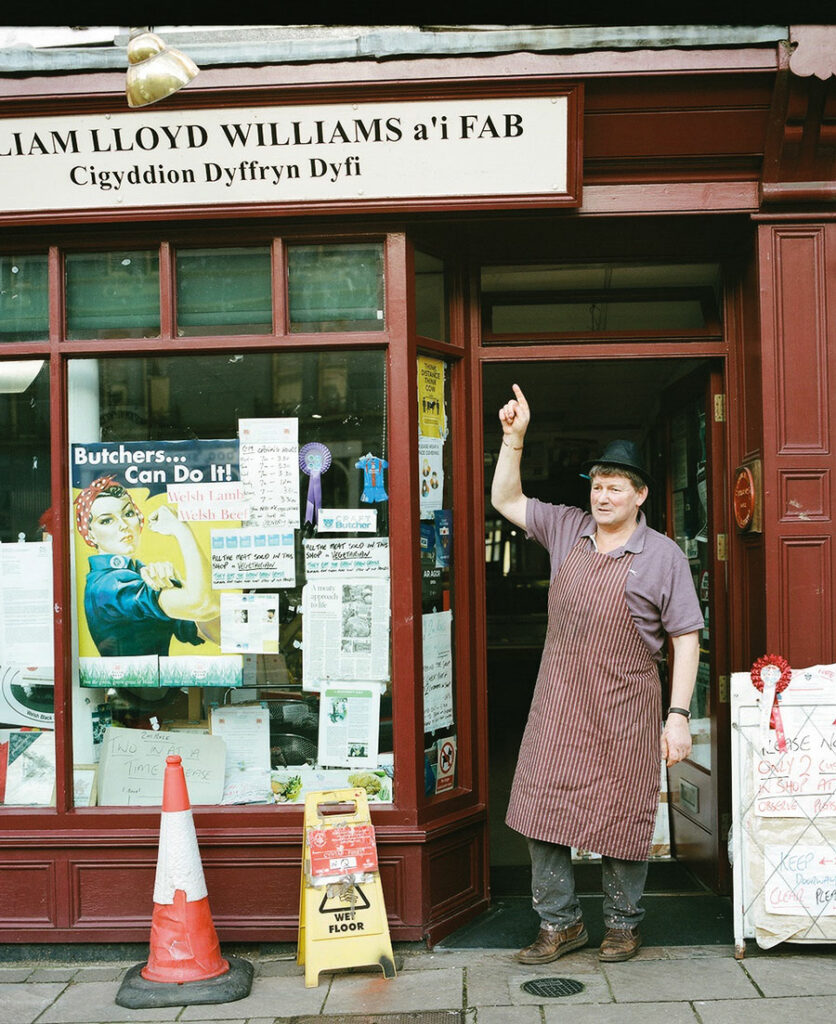Why local abattoirs are at risk and how farms are affected
 © Tim Scrivener
© Tim Scrivener
More than half of the 62 local abattoir owners could quit in the next five years unless there is a change in government policy, research shows.
The research, carried out by the National Craft Butchers organisation, paints a concerning picture of an ageing workforce without a solid succession plan.
The majority of owners – seven in 10 – were aged over 51, with 11% still working beyond the normal retirement age of 66, or older.
More than half (56%) had no plan for someone younger to take over their business.
Effect on food network
The losses of abattoir numbers on this scale would have far-reaching consequences for the UK food network, according to the Sustainable Food Trust.
The trust, a member of the Campaign for Local Abattoirs, says small-scale units reduce emissions, improve animal welfare, and support local food production, jobs and communities.
Spokeswoman Megan Perry says local abattoirs are better placed to handle smaller kills, returning carcasses to farm shops, butchers or online businesses for packing and processing.
See also: Abattoir capacity fears as farmers face shorter journey times
This helps to support the farm venture, which often trades on specialist cuts or on-farm processing to add value.
The local community benefits in turn, with jobs for skilled workers either at the facility itself or in butchers or retail outlets, Ms Perry says.
Shorter distances between farm and abattoir mean reduced fuel emissions, while longer journeys, often criticised by welfare lobby groups, are avoided.
Animal stress is also reduced because smaller batches take less time to load.
The Covid-19 pandemic has added further weight to the call for greater support for local abattoirs, which supplied a boom in online and farm shop sales.
The Food Standards Agency (FSA) also recognises that maintaining a network of local plants improves the nation’s resilience in the face of an emergency.
Speaking during the January lockdown, FSA chief executive Emily Miles suggested the pandemic had highlighted how a sector dominated by a few large plants could leave UK food processing capability more vulnerable.
If one or two were forced to close by a future disease outbreak, the supply chain could break down.
Major livestock disease threats such as African swine fever would also be more difficult to control without a network of local abattoirs.
Longer transport movements to centralised facilities could increase the risk of spread, while continuing trade during an epidemic relies on regionalisation.
What are the reasons for decline?
Staff shortages
Jason Aldiss of the Association of Independent Meat Suppliers (Aims) says Brexit and Covid-19 have hit the supply of skilled workers in local abattoirs.
Post-Brexit policies had failed to recognise the skill and high level of training needed in the sector. Abattoir workers are not included on the government’s priority Shortage Occupation List and the flow of overseas labour into the sector has fallen.
Restrictions imposed during the Covid-19 pandemic have added to the difficulties.
But the work itself was a further barrier to attracting younger workers.
Dr Aldiss says the government could help by funding targeted apprenticeship schemes to attract and train a supply of staff.
Paperwork
One of the biggest issues facing abattoirs is the disproportionate amount of red tape. Typically, local abattoirs handle higher numbers of small batches of animals.
Each one attracts the same amount of regulatory paperwork as a large batch. It can mean that a small unit faces as much paperwork as a larger processor.
With the workforce already stretched, the level of paperwork can become a huge strain, says Dr Aldiss.
Vet shortage
Aims policy director Norman Bagley wants to see a pragmatic approach from the government to help viable and efficient abattoirs cope with meat hygiene and veterinary inspection.
He says that the problem is not an overall shortage of veterinary cover, but a retasking of vets since Brexit.
The pool of vets has been taken up with meeting new trade obligations, such as issuing export health certificates. A lack of vet cover means some small abattoirs have at times been unable to operate.
Mr Bagley suggests that the problem could be resolved if the government revised regulations.
“Veterinary inspection is only required to meet export standards. Other countries like New Zealand have developed designated domestic kills with veterinary cover only required for export material,” he says.
This would cut vet cover requirements and costs.
It would be possible to revise the system to become multi-tiered with a risk-based vet attendance, Mr Bagley suggests. Mandatory CCTV coverage also means abattoir practice can be scrutinised.
Mr Bagley also raises concerns about the FSA’s use of contractors to carry out inspections.
This has encouraged a culture of reporting even the smallest issue which can lead to unnecessary and costly enforcement procedures, paperwork and downtime, he claims.
Enforcement notices have been issued for things such as missing bars of soap in toilets or failed light bulbs.
The over-zealous actions of inspectors has caused friction and an unpleasant atmosphere of mistrust, adding to pressure on owners and workers, Mr Bagley says.
Mobile abattoir progress
Plans to produce a network of mobile abattoirs are progressing, with operational testing and assessment for a first unit under way.
Plans had been produced in 2019 for a specially converted unit in a 7.5m-long lorry trailer, with construction due to start in early 2020. Then Covid-19 hit.
However, the team behind the scheme have since switched to a manufactured mobile unit brought in from Italy.
Independent consultant Jane Guise is acting as adviser for the project and has helped facilitate the purchase from Sicily-based manufacturer Cogemat.
The unit is about the same size as a shipping container at approximately 12m long, Dr Guise says.
“Cogemat’s experience was essential for us at this stage of the plan. We still intend to develop our own unit, but this will be two to three years away,” Dr Guise says.
Dr Guise says that the EU Rural Development Programme funded project is now undergoing final processing approval by the FSA.
First tests with sheep have been successfully completed, but negotiating the strict rules and licensing procedure will take many months.
Once the project is up and running, the facility will be trailer mounted and pulled by a Fastrac, travelling to farms in a 30-to-50-mile radius.
All classes of livestock will be handled and the likely scenario is for the unit to visit flocks and herds supplying high-end, artisan butchers and farm shops.
Case study: End of the road for Powys abattoir

William Lloyd Williams & Sons © Angus D Birditt
On 30 July William Lloyd Williams & Sons was the latest name added to a sorry roll-call of abattoirs that have ceased trading.
Closure brings an end to 91 years of tradition for the Lloyd Williams family in Machynlleth, Powys, where the thriving abattoir and its butcher’s shop serve the community.
More than 3,500 customers a week visit the shop – a former overall winner of the Country Life Food Award – and business is good.
Aside from the quality, food miles are very low because all stock is bought locally and traceability is second-to-none with the farmer-suppliers’ details displayed around the shop walls.
During the Covid-19 pandemic the business has done well, delivering food to isolated, elderly people and maintaining supplies even when supermarket shelves were empty.
But despite the healthy state of the business, owner William Lloyd Williams has had enough.
After 41 years running it, the strain on his health is no longer a price worth paying.
He points to a lack of understanding of businesses such as his which has been sunk by officialdom and choked by red tape.
“Because we handle small batches of animals from local farms, paperwork is duplicated.
“It doesn’t matter whether a farmer brings 1,000 sheep or five, there are always four forms to fill out for each batch,” he says.
“I had 22 batches through one day so had 88 forms to fill out.”
Electronic readers have not proved to be the hoped-for silver bullet. Readers sometimes fail, tags drop out and data doesn’t download, requiring tedious extra work and data input, he says. There are still forms to complete for the farmer as well, Mr Lloyd Williams adds.
It’s become common for Mr Lloyd Williams to work from early morning until 9pm, seven days a week just to keep on top of the office work.
Tens of thousands of pounds of investment has been made to bring the facility up to date, including wall liners and ventilation systems.
Mandatory CCTV cameras came with a bill of £4,500 – a figure easily soaked up by a big business, but far harder for a small one to absorb.
Over-zealous inspections are a common complaint.
“It is demoralising when you have as much experience as I have to be reprimanded for things like a cobweb in the toilet or a faulty light bulb,” Mr Lloyd Williams says.
He alleges there is a culture among inspectors that they must always find something, no matter how small.
“Before I get to work I am already under stress, worrying about what will be picked up,” he says.
The attitudes of officials, workload, and stress have not only deterred Mr Lloyd Williams from continuing, but put off any takeover.
His son has opted for a career outside the family business, and even a potentially valuable handover to staff has not proved incentive enough.
“Nobody wants the pressure and strain this business comes with,” Mr Lloyd Williams says.
The abattoir is to be demolished and the site sold for development.
